高考英语传统文化相关知识点
- 格式:docx
- 大小:24.94 KB
- 文档页数:9
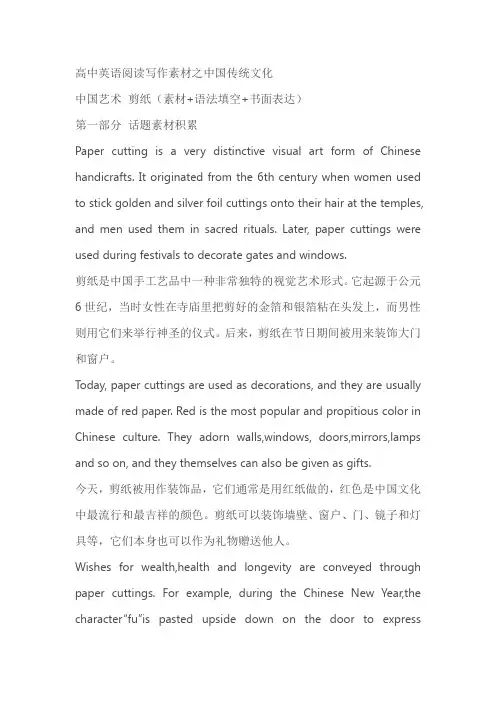
高中英语阅读写作素材之中国传统文化中国艺术剪纸(素材+语法填空+书面表达)第一部分话题素材积累Paper cutting is a very distinctive visual art form of Chinese handicrafts. It originated from the 6th century when women used to stick golden and silver foil cuttings onto their hair at the temples, and men used them in sacred rituals. Later, paper cuttings were used during festivals to decorate gates and windows.剪纸是中国手工艺品中一种非常独特的视觉艺术形式。
它起源于公元6世纪,当时女性在寺庙里把剪好的金箔和银箔粘在头发上,而男性则用它们来举行神圣的仪式。
后来,剪纸在节日期间被用来装饰大门和窗户。
Today, paper cuttings are used as decorations, and they are usually made of red paper. Red is the most popular and propitious color in Chinese culture. They adorn walls,windows, doors,mirrors,lamps and so on, and they themselves can also be given as gifts.今天,剪纸被用作装饰品,它们通常是用红纸做的,红色是中国文化中最流行和最吉祥的颜色。
剪纸可以装饰墙壁、窗户、门、镜子和灯具等,它们本身也可以作为礼物赠送他人。
Wishes for wealth,health and longevity are conveyed through paper cuttings. For example, during the Chinese New Year,the character“fu”is pasted upside down on the door to expresspeople's wish for the coming of good luck.剪纸传达了人们对财富、健康和长寿的祝愿。
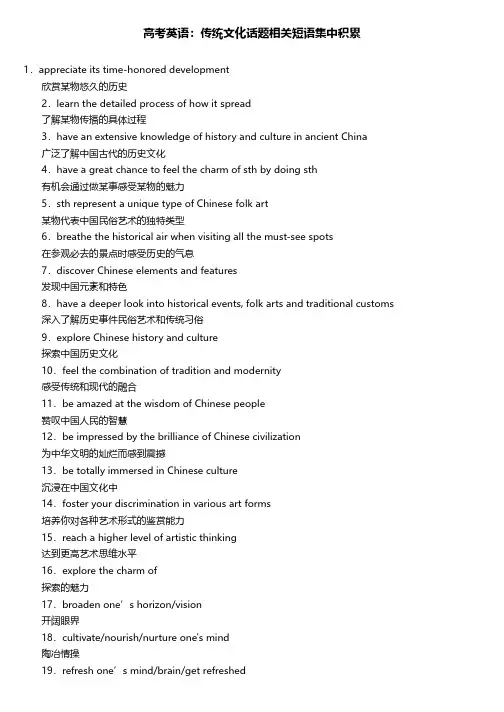
高考英语:传统文化话题相关短语集中积累1.appreciate its time-honored development欣赏某物悠久的历史2.learn the detailed process of how it spread了解某物传播的具体过程3.have an extensive knowledge of history and culture in ancient China广泛了解中国古代的历史文化4.have a great chance to feel the charm of sth by doing sth有机会通过做某事感受某物的魅力5.sth represent a unique type of Chinese folk art某物代表中国民俗艺术的独特类型6.breathe the historical air when visiting all the must-see spots在参观必去的景点时感受历史的气息7.discover Chinese elements and features发现中国元素和特色8.have a deeper look into historical events, folk arts and traditional customs 深入了解历史事件民俗艺术和传统习俗9.explore Chinese history and culture探索中国历史文化10.feel the combination of tradition and modernity感受传统和现代的融合11.be amazed at the wisdom of Chinese people赞叹中国人民的智慧12.be impressed by the brilliance of Chinese civilization为中华文明的灿烂而感到震撼13.be totally immersed in Chinese culture沉浸在中国文化中14.foster your discrimination in various art forms培养你对各种艺术形式的鉴赏能力15.reach a higher level of artistic thinking达到更高艺术思维水平16.explore the charm of探索的魅力17.broaden one’s horizon/vision开阔眼界18.cultivate/nourish/nurture one's mind陶冶情操19.refresh one’s mind/brain/get refreshed提神醒脑,恢复精力20.spread the essence of Chinese culture传播中国文化的精髓21.promote cultural diversity促进文化多样性22.enhance cultural confidence增强文化自信23.boost cultural prosperity促进文化繁荣24.improve cultural soft power增强文化软实力25.better carry forward Chinese culture更好地弘扬中国文化26.consolidate national cohesion增强民族凝聚力27.enjoy wide popularity脍炙人口28.attract the one’s attention吸引眼球29.beautiful melody and simple lyrics旋律优美 歌词简单30.stand out among all the competitors脱颖而出31.Chinese folk arts and crafts民俗手工艺32.have a long history of有悠久的历史33.respect the local customs尊重当地风俗34.increase one’s knowledge about Chinese culture 增加对中国文化的了解35.culture shock文化冲击36.spread Chinese culture传播中国文化# 01 传统文化常用搭配 #文明摇篮 cradle of civilization无愧于时代的作品 works worthy of the times古文明 ancient civilization古为今用 to make the past serve the present洋为中用 to make the foreign serve China中外学者 Chinese and overseas scholars博大精深 to be extensive and profound享有……的声誉 to enjoy a good/high reputation for被誉为 to be honored/crowned as文化娱乐活动 cultural and amusement activities文化产业 culture industry文化底蕴 cultural deposit文化事业 cultural undertaking文化交流 cultural exchange文化冲击 culture shock文化差异 cultural difference占据重要地位 to play a significant role; to have/ occupy a significant place 肩负……的责任 to shoulder the responsibility of...与……密不可分 to be closely associated with…推广中国文化 to promote Chinese culture促进世界和平 to promote world peace增进友谊 to enhance friendship民族特性和价值观 national identity and value在各地差异很大 to vary widely from region/place to region/place促进文化的传播 to promote the spread of culture促进交流 to promote exchanges蓬勃发展 to flourish丰富多彩 to be rich and colorful中华民族 the Chinese nation传统美德 traditional virtues# 02 语音文字 #汉字 Chinese character单音节 single syllable上声 falling-rising tone去声 falling tone阴平 level tone阳平 rising tone# 03 传统文学 #四书 the Four Books《大学》The Great Learning《中庸》The Doctrine of the Mean《论语》The Analects of Confucius《孟子》The Mencius《春秋》The Spring and Autumn Annals《史记》Historical Records《诗经》The Books of Songs/The Book of Odes 《书经》The Books of History《易经》The Book of Changes《礼记》The Book of Rites《孙子兵法》The Art of War# 04 优秀民间艺术 #火药 gunpowder印刷术 printing造纸术 paper-making指南针 compass武术 martial art功夫 kung fu中国结 Chinese knot皮影戏 shadow play说书 story-telling叠罗汉 make a human pyramid踩高跷 stilt walk戏剧小品 skit相声 witty dialogue comedy/comic cross talk 杂技 acrobatics拳击 boxing篆刻 seal cutting卷轴 scroll蜡染 batik泥人 clay figure漆画 lacquer painting# 05 传统戏剧 #戏剧艺术 theatrical art生 male (the positive male role)旦 female (the positive female role)净 a supporting male role丑 a clown or a negative role花脸 painted role滑稽场面, 搞笑小噱头 shtick滑稽短剧 skit京剧人物脸谱 Peking Opera Mask# 06 节日 #二十四节气 the twenty-four solar terms春节 the Spring Festival元宵节 the Lantern Festival清明节 the Tomb-sweeping Day端午节 the Dragon Boat Festival中秋节 the Moon Festival/the Mid-Autumn Day重阳节 the Double Ninth Day/the Aged Day天干 heavenly stem地支 earthly branch阳历 solar calendar公历 Gregorian calendar阴历 lunar calendar闰年 leap year# 07 平安健康#尊敬老人 to respect the elderly赡养父母 to support/take care of parents继承 to inherit后人 later generation强身健体 to improve the physical health; to strengthen the body 益寿延年 to prolong life保佑平安 to keep sb. safe象征意义 symbolic meaning象征好运和祝福 to symbolize good luck and blessings# 08 其它#重要文化遗产 major cultural heritage中国画 traditional Chinese painting书法 calligraphy水墨画 Chinese brush painting / ink and wash painting工笔 traditional Chinese realistic painting民间传说 folklores寓言 fable传说 legend神话 mythology赋诗 inscribe a poem对对联 matching an antithetical couplet中华文明 Chinese civilization文明摇篮 cradle of civilization华夏祖先 the Chinese ancestors 朝廷使者 royal court envoy文人 men of letters雅士 refined scholars文物 cultural relics。
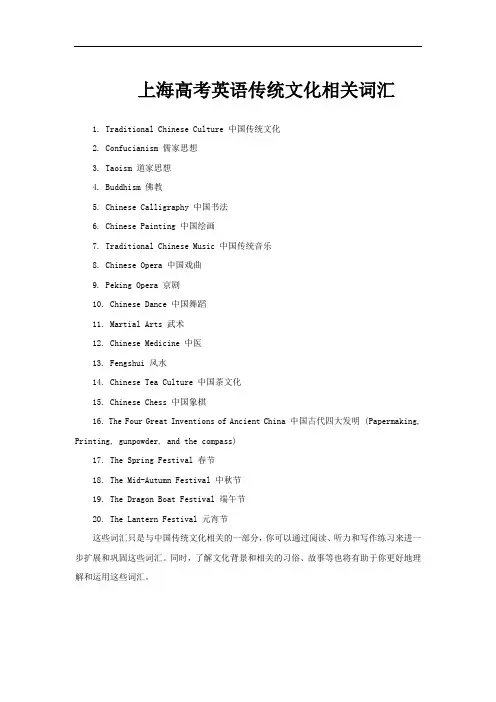
上海高考英语传统文化相关词汇
1. Traditional Chinese Culture 中国传统文化
2. Confucianism 儒家思想
3. Taoism 道家思想
4. Buddhism 佛教
5. Chinese Calligraphy 中国书法
6. Chinese Painting 中国绘画
7. Traditional Chinese Music 中国传统音乐
8. Chinese Opera 中国戏曲
9. Peking Opera 京剧
10. Chinese Dance 中国舞蹈
11. Martial Arts 武术
12. Chinese Medicine 中医
13. Fengshui 风水
14. Chinese Tea Culture 中国茶文化
15. Chinese Chess 中国象棋
16. The Four Great Inventions of Ancient China 中国古代四大发明 (Papermaking, Printing, gunpowder, and the compass)
17. The Spring Festival 春节
18. The Mid-Autumn Festival 中秋节
19. The Dragon Boat Festival 端午节
20. The Lantern Festival 元宵节
这些词汇只是与中国传统文化相关的一部分,你可以通过阅读、听力和写作练习来进一步扩展和巩固这些词汇。
同时,了解文化背景和相关的习俗、故事等也将有助于你更好地理解和运用这些词汇。
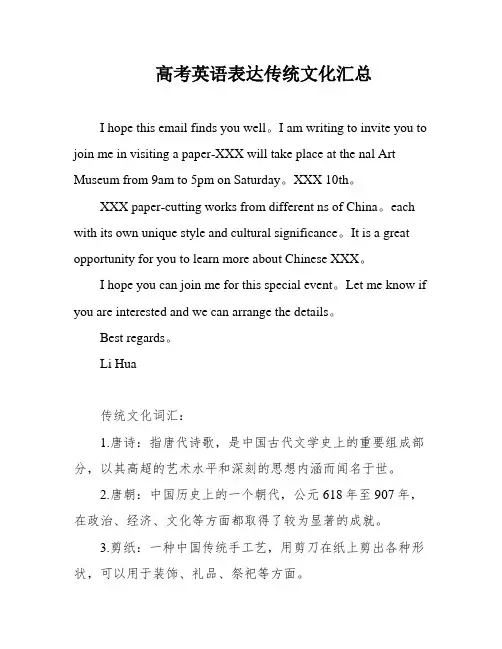
高考英语表达传统文化汇总I hope this email finds you well。
I am writing to invite you to join me in visiting a paper-XXX will take place at the nal Art Museum from 9am to 5pm on Saturday。
XXX 10th。
XXX paper-cutting works from different ns of China。
each with its own unique style and cultural significance。
It is a great opportunity for you to learn more about Chinese XXX。
I hope you can join me for this special event。
Let me know if you are interested and we can arrange the details。
Best regards。
Li Hua传统文化词汇:1.唐诗:指唐代诗歌,是中国古代文学史上的重要组成部分,以其高超的艺术水平和深刻的思想内涵而闻名于世。
2.唐朝:中国历史上的一个朝代,公元618年至907年,在政治、经济、文化等方面都取得了较为显著的成就。
3.剪纸:一种中国传统手工艺,用剪刀在纸上剪出各种形状,可以用于装饰、礼品、祭祀等方面。
Dear XXX。
I was XXX in Chinese history。
As a Chinese student。
I am more than happy to XXX – Confucius.Confucius XXX。
known as Confucianism。
have had a profound XXX moral values。
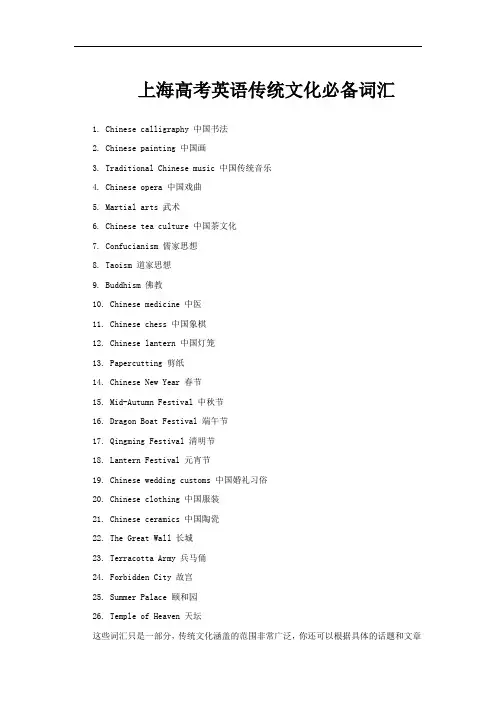
上海高考英语传统文化必备词汇1. Chinese calligraphy 中国书法2. Chinese painting 中国画3. Traditional Chinese music 中国传统音乐4. Chinese opera 中国戏曲5. Martial arts 武术6. Chinese tea culture 中国茶文化7. Confucianism 儒家思想8. Taoism 道家思想9. Buddhism 佛教10. Chinese medicine 中医11. Chinese chess 中国象棋12. Chinese lantern 中国灯笼13. Papercutting 剪纸14. Chinese New Year 春节15. Mid-Autumn Festival 中秋节16. Dragon Boat Festival 端午节17. Qingming Festival 清明节18. Lantern Festival 元宵节19. Chinese wedding customs 中国婚礼习俗20. Chinese clothing 中国服装21. Chinese ceramics 中国陶瓷22. The Great Wall 长城23. Terracotta Army 兵马俑24. Forbidden City 故宫25. Summer Palace 颐和园26. Temple of Heaven 天坛这些词汇只是一部分,传统文化涵盖的范围非常广泛,你还可以根据具体的话题和文章内容进一步扩展词汇量。
同时,理解和运用这些词汇需要结合相关的文化背景知识,以确保准确表达和理解其含义。
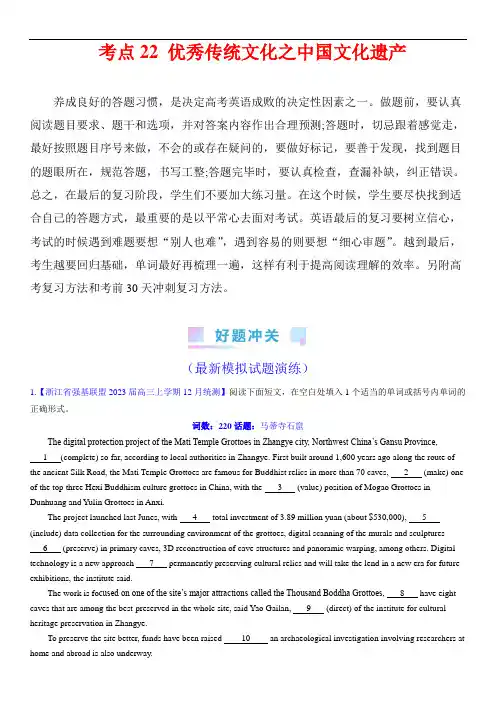
考点22 优秀传统文化之中国文化遗产养成良好的答题习惯,是决定高考英语成败的决定性因素之一。
做题前,要认真阅读题目要求、题干和选项,并对答案内容作出合理预测;答题时,切忌跟着感觉走,最好按照题目序号来做,不会的或存在疑问的,要做好标记,要善于发现,找到题目的题眼所在,规范答题,书写工整;答题完毕时,要认真检查,查漏补缺,纠正错误。
总之,在最后的复习阶段,学生们不要加大练习量。
在这个时候,学生要尽快找到适合自己的答题方式,最重要的是以平常心去面对考试。
英语最后的复习要树立信心,考试的时候遇到难题要想“别人也难”,遇到容易的则要想“细心审题”。
越到最后,考生越要回归基础,单词最好再梳理一遍,这样有利于提高阅读理解的效率。
另附高考复习方法和考前30天冲刺复习方法。
(最新模拟试题演练)1.【浙江省强基联盟2023届高三上学期12月统测】阅读下面短文,在空白处填入1个适当的单词或括号内单词的正确形式。
词数:220话题:马蒂寺石窟The digital protection project of the Mati Temple Grottoes in Zhangye city, Northwest China’s Gansu Province,___1___(complete) so far, according to local authorities in Zhangye. First built around 1,600 years ago along the route of the ancient Silk Road, the Mati Temple Grottoes are famous for Buddhist relics in more than 70 caves, ___2___ (make) one of the top three Hexi Buddhism culture grottoes in China, with the ___3___ (value) position of Mogao Grottoes in Dunhuang and Yulin Grottoes in Anxi.The project launched last Junes, with ___4___ total investment of 3.89 million yuan (about $530,000), ___5___ (include) data collection for the surrounding environment of the grottoes, digital scanning of the murals and sculptures___6___ (preserve) in primary caves, 3D reconstruction of cave structures and panoramic warping, among others. Digital technology is a new approach ___7___ permanently preserving cultural relics and will take the lend in a new era for future exhibitions, the institute said.The work is fo cused on one of the site’s major attractions called the Thousand Boddha Grottoes, ___8___ have eight caves that are among the best-preserved in the whole site, said Yao Gailan, ___9___ (direct) of the institute for cultural heritage preservation in Zhangye.To preserve the site better, funds have been raised ____10____ an archaeological investigation involving researchers at home and abroad is also underway.【答案】1.has been completed 2.making 3.valuable 4.a 5.includes 6.preserved 7.to 8.which 9.director 10.and 【文章大意】本文是一篇说明文。
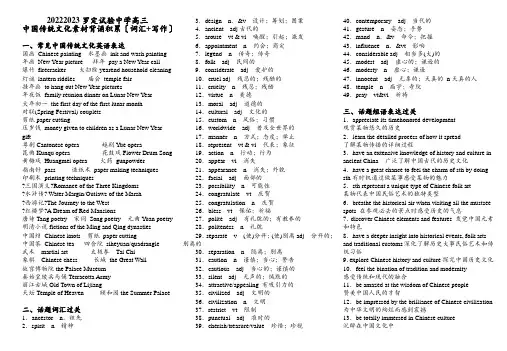
20222023罗定试验中学高三中国传统文化素材背诵积累〔词汇+写作〕一、常见中国传统文化英语表达国画Chinese painting 水墨画ink and wash painting年画New Year picture 拜年pay a New Year call爆竹firecracker 大扫除yearend household cleaning 灯谜lantern riddles 庙会temple fair挂年画to hang out New Year pictures年夜饭family reunion dinner on Lunar New Year大年初一the first day of the first lunar month对联(Spring Festival) couplets剪纸paper cutting压岁钱money given to children as a Lunar New Yeargift粤剧Cantonese opera 越剧Y ue opera昆曲Kunqu opera 花鼓戏Flower Drum Song 黄梅戏Huangmei opera 火药gunpowder指南针pass 造纸术paper making techniques印刷术printing techniques三国演义?Romance of the Three Kingdoms水浒传? Water Margin/Outlaws of the Marsh西游记?The Journey to the West红楼梦?A Dream of Red Mansions唐诗Tang poetry 宋词Song poetry 元曲Y uan poetry 明清小说fictions of the Ming and Qing dynasties中国结Chinese knots 剪纸paper cutting中国茶Chinese tea 四合院siheyuan/quadrangle武术martial art 太极拳Tai Chi象棋Chinese chess 长城the Great Wall故宫博物院the Palace Museum秦始皇陵兵马俑Terracotta Army丽江古城Old Town of Lijiang天坛Temple of Heaven 颐和园the Summer Palace 二、话题词汇过关1.ancestor n.祖先2.spirit n 精神3.design n.&v 设计;筹划;图案4.ancient adj古代的5.arouse vt & vi 唤醒;引起;激发6.appointment n 约会;商定7.legend n 传奇;传奇8.folk adj 民间的9.considerate adj 爱护的10.cruel adj 残忍的;残酷的11.cruelty n 残忍;残酷12.virtue n 美德13.moral adj 道德的14.cultural adj 文化的15.custom n 风俗;习惯16.worldwide adj 普及全世界的17.manner n 方式;态度;举止18.represent vt & vi 代表;象征19.action n 行动;行为20.appear vi 消失21.appearance n 消失;外貌22.facial adj 面部的23.possibility n 可能性24.congratulate vt 庆贺25.congratulation n 庆贺26.bless vt 保佑;祈福27.polite adj 有礼貌的;有教养的28.politeness n 礼貌29.separate v (使)分开;(使)别离adj 分开的;别离的30.separation n 隔离;别离31.caution n 谨慎;当心;警告32.cautious adj 当心的;谨慎的33.silent adj 无声的;缄默的34.attractive/appealing 有吸引力的35.civilized adj 文明的36.civilization n 文明37.restrict vt 限制38.punctual adj 准时的39.cherish/treasure/value 珍惜;珍视40.contemporary adj 当代的41.gesture n 姿态;手势42.mand n.&v 命令;把握43.influence n.&vt 影响44.considerable adj 相当多(大)的45.modest adj 虚心的;谦逊的46.modesty n 虚心;谦逊47.innocent adj 无辜的;天真的n天真的人48.temple n 庙宇;寺院49.pray vt&vi 祈祷三、话题短语表达过关1.appreciate its timehonored development观赏某物悠久的历史2.learn the detailed process of how it spread了解某物传播的详细过程3.have an extensive knowledge of history and culture inancient China 广泛了解中国古代的历史文化4.have a great chance to feel the charm of sth by doingsth有时机通过做某事感受某物的魅力5.sth represent a unique type of Chinese folk art某物代表中国民俗艺术的独特类型6.breathe the historical air when visiting all the mustseespots 在参观必去的景点时感受历史的气息7.discover Chinese elements and features 发觉中国元素和特色8.have a deeper insight into historical events, folk artsand traditional customs深化了解历史大事民俗艺术和传统习俗9.explore Chinese history and culture探究中国历史文化10.feel the bination of tradition and modernity感受传统和现代的融合11.be amazed at the wisdom of Chinese people赞美中国人民的才智12.be impressed by the brilliance of Chinese civilization为中华文明的绚烂而感到震撼13.be totally immersed in Chinese culture沉醉在中国文化中14.foster your discrimination in various art forms培育你对各种艺术形式的鉴赏力量15.reach a higher level of artistic thinking到达更高艺术思维水平16.explore the charm of 探究的魅力17.broaden one’s horizon/vision 开阔眼界18.cultivate/nourish/nurture one’ s mind 陶冶情操19.refresh one’s mind/brain/get refreshed提神醒脑,恢复精力20.spread the essence of Chinese culture传播中国文化的精髓21.promote cultural diversity 促进文化多样性22.enhance cultural confidence 增加文化自信23.boost cultural prosperity 促进文化富强24.improve cultural soft power 增加文化软实力25.better carry forward Chinese culture更好地弘扬中国文化26.enjoy wide popularity 脍炙人口27.attract the one’s attention 吸引眼球28.beautiful melody and simple lyrics旋律美丽,歌词简洁29.stand out among all the petitors 脱颖而出30.Chinese folk arts and crafts 民俗手工艺31.have a long history of 有悠久的历史32.respect the local customs 敬重当地风俗33.increase one’s knowledge about Chinese culture增加对中国文化的了解34.culture shock 文化冲击35.spread Chinese culture 传播中国文化四、话题句型:1:In addition, you will have a chance to learn how to make dumplings, which is a typical Chinese custom, where I believe you are sure to have great fun.你们将有时机学习如何包饺子,这是中国典型的习俗,我信任你们肯定会感受到欢乐。
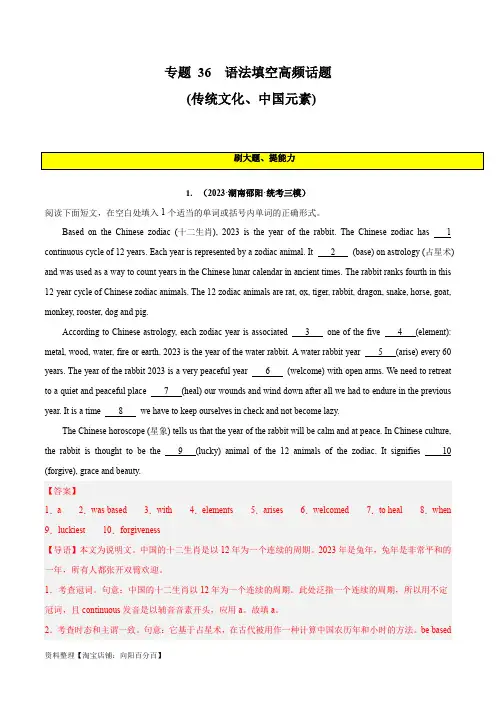
专题36 语法填空高频话题(传统文化、中国元素)1.(2023·湖南邵阳·统考三模)阅读下面短文,在空白处填入1个适当的单词或括号内单词的正确形式。
Based on the Chinese zodiac (十二生肖), 2023 is the year of the rabbit. The Chinese zodiac has 1 continuous cycle of 12 years. Each year is represented by a zodiac animal. It 2 (base) on astrology (占星术) and was used as a way to count years in the Chinese lunar calendar in ancient times. The rabbit ranks fourth in this 12-year cycle of Chinese zodiac animals. The 12 zodiac animals are rat, ox, tiger, rabbit, dragon, snake, horse, goat, monkey, rooster, dog and pig.According to Chinese astrology, each zodiac year is associated 3 one of the five 4 (element): metal, wood, water, fire or earth. 2023 is the year of the water rabbit. A water rabbit year 5 (arise) every 60 years. The year of the rabbit 2023 is a very peaceful year 6 (welcome) with open arms. We need to retreat to a quiet and peaceful place 7 (heal) our wounds and wind down after all we had to endure in the previous year. It is a time 8 we have to keep ourselves in check and not become lazy.The Chinese horoscope (星象) tells us that the year of the rabbit will be calm and at peace. In Chinese culture, the rabbit is thought to be the 9 (lucky) animal of the 12 animals of the zodiac. It signifies 10 (forgive), grace and beauty.【答案】1.a 2.was based 3.with 4.elements 5.arises 6.welcomed 7.to heal 8.when 9.luckiest 10.forgiveness【导语】本文为说明文。
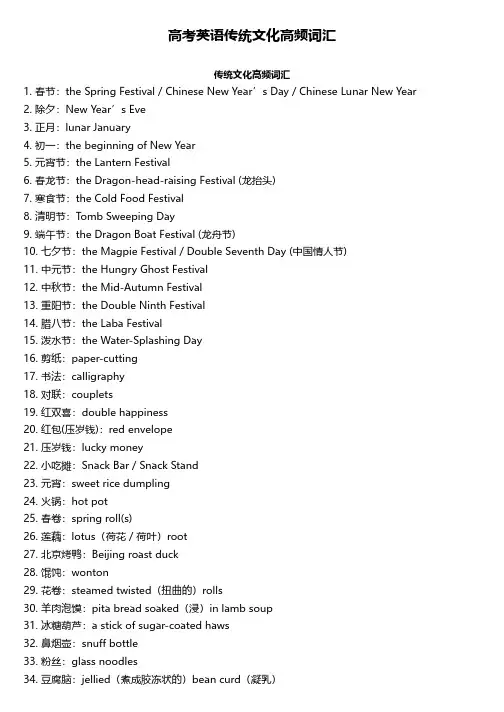
高考英语传统文化高频词汇传统文化高频词汇1. 春节:the Spring Festival / Chinese New Year’s Day / Chinese Lunar New Year2. 除夕:New Year’s Eve3. 正月:lunar January4. 初一:the beginning of New Year5. 元宵节:the Lantern Festival6. 春龙节:the Dragon-head-raising Festival (龙抬头)7. 寒食节:the Cold Food Festival8. 清明节:Tomb Sweeping Day9. 端午节:the Dragon Boat Festival (龙舟节)10. 七夕节:the Magpie Festival / Double Seventh Day (中国情人节)11. 中元节:the Hungry Ghost Festival12. 中秋节:the Mid-Autumn Festival13. 重阳节:the Double Ninth Festival14. 腊八节:the Laba Festival15. 泼水节:the Water-Splashing Day16. 剪纸:paper-cutting17. 书法:calligraphy18. 对联:couplets19. 红双喜:double happiness20. 红包(压岁钱):red envelope21. 压岁钱:lucky money22. 小吃摊:Snack Bar / Snack Stand23. 元宵:sweet rice dumpling24. 火锅:hot pot25. 春卷:spring roll(s)26. 莲藕:lotus(荷花 / 荷叶)root27. 北京烤鸭:Beijing roast duck28. 馄饨:wonton29. 花卷:steamed twisted(扭曲的)rolls30. 羊肉泡馍:pita bread soaked(浸)in lamb soup31. 冰糖葫芦:a stick of sugar-coated haws32. 鼻烟壶:snuff bottle33. 粉丝:glass noodles34. 豆腐脑:jellied(煮成胶冻状的)bean curd(凝乳)35. 东坡肉:Dongpo Pork36. 咸水鸭:boiled salted duck37. 鸭血粉丝汤:duck blood and silk noodles soup38. 长城:The Great Wall39. 故宫博物院:The Palace Museum40. 天坛:The Temple of Heaven41. 敦煌莫高窟:Mogao Caves42. 兵马俑:Cotta Warriors / Terracotta Army43. 《诗经》:The Book of Songs44. 《史记》:Historical Records / Records of the Grand Historian45. 《红楼梦》:A Dream of Red Mansions (公馆)46. 《西游记》:The Journey to the West47. 孔子:Confucius48. 孟子:Mencius49. 京剧:Beijing Opera / Peking Opera50. 黄梅戏:Huangmei Opera51. 秦腔:Crying of Qin People / Qin Opera52. 太极拳:t'ai chi53. 文房四宝 (笔墨纸砚) :the Four Treasure of the Study / Brush, Ink stick, Paper, and Ink stone54. 宣纸:rice paper55. 相声:cross-talk / comic(滑稽的) dialogue56. 木偶戏:puppet(木偶)show57. 小品:witty(机智的)skits(滑稽剧)58. 武术:Wushu / Chinese Martial Arts59. 中庸:the way of medium / golden means60. 火药:gunpowder61. 指南针:compass62. 造纸术:Papermaking63. 印刷术:Printing Technique64. 高铁:high-speed rail65. 网购:online shopping66. 电子支付系统:E-payment systems67. 共享单车:bike-sharing services68. 刺绣:Embroidery69. 针灸:acupuncture70. 五行:Five Phases71. 旗袍:cheongsam72. 叩头:kowtow73. 秦淮河:Qinhuai River74. 明孝陵:Ming Tomb75. 云锦:Nanjing brocade76. 中国结:Chinese knot77. 皮影戏:shadow play78. 壁画:mural79. 水墨画:ink and wash painting80. 青铜器:bronze ware81. 漆器:lacquer ware82. 彩陶:painted pottery83. 彩塑:painted sculpture84. 折扇:folding fan85. 杂技:acrobatics86. 踩高跷:stilt walking87. 猜拳:finger-guessing game88. 灯谜:lantern riddles89. 庙会:temple fair90. 四合院:siheyuan / quadrangle91. 气功:Qigong92. 甲骨文:Oracle Bone Inscriptions93. 二人转:Errenzhuan94. 八宝饭:eight-treasure rice pudding95. 大扫除:year-end household cleaning96. 老字号:China Time-honoured Brand97. 说书:monologue story-telling98. 拨浪鼓:shaking drum99. 屏风:screen100. 盆景:potted landscape。
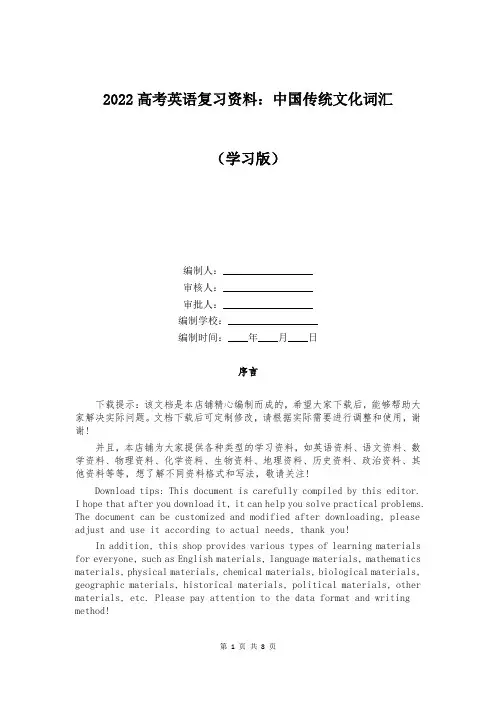
2022高考英语复习资料:中国传统文化词汇(学习版)编制人:__________________审核人:__________________审批人:__________________编制学校:__________________编制时间:____年____月____日序言下载提示:该文档是本店铺精心编制而成的,希望大家下载后,能够帮助大家解决实际问题。
文档下载后可定制修改,请根据实际需要进行调整和使用,谢谢!并且,本店铺为大家提供各种类型的学习资料,如英语资料、语文资料、数学资料、物理资料、化学资料、生物资料、地理资料、历史资料、政治资料、其他资料等等,想了解不同资料格式和写法,敬请关注!Download tips: This document is carefully compiled by this editor.I hope that after you download it, it can help you solve practical problems. The document can be customized and modified after downloading, please adjust and use it according to actual needs, thank you!In addition, this shop provides various types of learning materials for everyone, such as English materials, language materials, mathematics materials, physical materials, chemical materials, biological materials, geographic materials, historical materials, political materials, other materials, etc. Please pay attention to the data format and writing method!2022高考英语复习资料:中国传统文化词汇--> 2022高考英语复习资料:中国传统文化词汇1. 关于……人们有不同的观点。
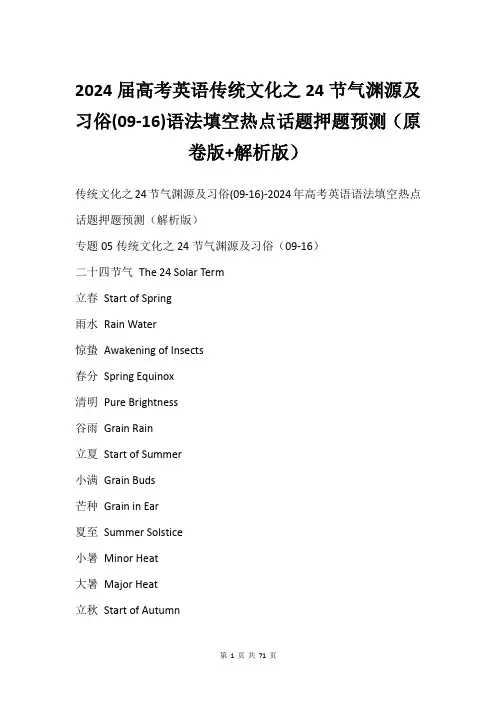
2024届高考英语传统文化之24节气渊源及习俗(09-16)语法填空热点话题押题预测(原卷版+解析版)传统文化之24节气渊源及习俗(09-16)-2024年高考英语语法填空热点话题押题预测(解析版)专题05传统文化之24节气渊源及习俗(09-16)二十四节气The 24 Solar Term立春Start of Spring雨水Rain Water惊蛰Awakening of Insects春分Spring Equinox清明Pure Brightness谷雨Grain Rain立夏Start of Summer小满Grain Buds芒种Grain in Ear夏至Summer Solstice小暑Minor Heat大暑Major Heat立秋Start of Autumn处暑End of Heat白露White Dew秋分Autumn Equinox寒露Cold Dew霜降Frost's Descent立冬Start of Winter小雪Minor Snow大雪Major Snow冬至Winter Solstice小寒Minor Cold大寒Major Cold语法填空二十四节气之芒种(09)阅读下面短文,在空白处填入1个适当的单词或括号内单词的正确形式。
One solar term gives way to another as summer takes hold. After Xiao man, or “grain buds”, it’s time for Mang zhong, or “grain in ear”, 1 Chinese solar term for summer. This year, Mang zhong starts on June 6. According to this solar term, most of China will see the hot dry days of summer 2 the areas around the Yangtze River will experience rain.Mang refers to the thistle (蓟) on the seeds of grain plants and zhong refers to harvesting and sowing, 3 happen at the same time.The beginning of Mang zhong means the grains are fully grown and waiting to 4 (harvest). So like other solar terms, it also 5 (reflect) agricultural phenology (物候学).In Chinese, mang has the same 6 (pronounce) as another mang, which means “busy”. Mang zhong is also regarded by Chinese farmers 7 “busy farming”.Tang Dynasty poet Bai Juyi described the busy scene of people 8 (work) on farmlands during the period in his poem, titled Guan Yimai (Watching the Wheat Harvest): “Farm families have few leisurely 9 (month). In the 10 (five) lunar month, they are twice as busy. The southern breeze arises in the evenings. Covered fields of wheat now turn yellow… Married women and unmarried girls carry round bamboo containers on poles full of food. Children follow with pots of food and water. Following each other into the fields to serve food and drink for the strong men in the southern fields.”【答案】1.a 2.but 3.which 4.be harvested 5.reflects 6.pronunciation 7.as 8.working 9.months 10.fifth 【导语】本文是一篇说明文。
高考英语传统文化知识点随着社会的进步和发展,传统文化的重要性愈发凸显出来。
传统文化是一个民族的骨髓,它承载着国民的精神、道德、价值观等方面的核心。
对于中国学生来说,了解和掌握自己的传统文化已经成为一种紧迫的需求。
高考英语中也逐渐加大对传统文化知识点的考查力度,下面将从文化、历史和艺术等多个维度分析与传统文化相关的英语考试知识点。
文化维度:作为中国人,了解和传承中华传统文化是我们的一种责任。
在高考英语中,有关传统文化的考察主要集中于文化习俗、传统节日、书法和绘画等方面。
例如,文化习俗方面,考生可以了解到中国人重视孝敬父母的传统观念,以及传统婚礼上的一些仪式和习俗;在传统节日方面,包括春节、中秋节、元宵节等都是高考英语中常见的考点;而书法和绘画方面,考生可以了解到中国传统绘画的基本特点和书法的几种字体。
理解这些传统文化知识点,除了可以在阅读理解中获得更多分数外,对于学生的综合素养也有所帮助。
历史维度:历史是进步的镜鉴,了解历史可以帮助我们更好的认识和把握未来。
高考英语中对于传统文化的历史知识主要集中于历史人物和重要事件的介绍。
例如,孔子是中国历史上伟大的思想家和教育家,被誉为“至圣先师”,他的思想和教育理念对中国影响深远,也是高考英语常考的考点之一;另外,一些中国历史上重要的事件如辛亥革命、五四运动等也是高考英语中常见的考查对象。
通过理解这些历史知识点,可以帮助考生更好地理解文章中的相关内容,提高语言理解和运用的能力。
艺术维度:中国传统艺术是中华文明的重要组成部分,包括音乐、戏曲、舞蹈等多种形式。
在高考英语中,对于传统艺术的考察主要集中在音乐和戏曲方面。
考生可以了解到古琴、古筝等传统乐器,以及京剧、评剧等传统戏曲的基本特点。
了解传统艺术不仅可以帮助考生更好地理解相关的文章材料,也能开阔视野,提高人文素养。
总之,了解中国传统文化对于高考英语考试至关重要。
通过了解文化、历史和艺术等多个维度的传统文化知识点,考生可以更好地理解和运用相关的英语知识,提高阅读理解和写作水平。
考点20 优秀传统文化之中国古建筑养成良好的答题习惯,是决定高考英语成败的决定性因素之一。
做题前,要认真阅读题目要求、题干和选项,并对答案内容作出合理预测;答题时,切忌跟着感觉走,最好按照题目序号来做,不会的或存在疑问的,要做好标记,要善于发现,找到题目的题眼所在,规范答题,书写工整;答题完毕时,要认真检查,查漏补缺,纠正错误。
总之,在最后的复习阶段,学生们不要加大练习量。
在这个时候,学生要尽快找到适合自己的答题方式,最重要的是以平常心去面对考试。
英语最后的复习要树立信心,考试的时候遇到难题要想“别人也难”,遇到容易的则要想“细心审题”。
越到最后,考生越要回归基础,单词最好再梳理一遍,这样有利于提高阅读理解的效率。
另附高考复习方法和考前30天冲刺复习方法。
真题感知1.(2023·全国乙卷)阅读下面短文,在空白处填入1个适当的单词或括号内单词的正确形式。
词数:197 话题:北京的建筑Beijing is a city bridging the ancient and the modern. From Buddhist temples to museums, narrow hutong 61 royal palaces, it is home to more than 3,000 years of glorious history even down to its layout, with the city keeping its carefully 62 (build) system of ring roads.But for all its ancient buildings, Beijing is also a place 63 welcomes the fast-paced development of modern life, with 21st-century architectural 64 (wonder) standing side by side with historical buildings of the past.It is a distinct visual contrast (反差) that shouldn’t work,65 somehow these two very different worlds make a good combination. 66 (visit) several times over the last 10 years, I 67 (amaze) by the co-existence of old and new, and how a city was able to keep such a rich heritage (遗产) while constantly growing. As a photographer, I have spent the last two years 68 (record) everything I discovered.The 69 (remark) development of this city, which is consciously designed to protect the past while stepping into the modern world, 70 (mean) there is always something new to discover here, and I could be photographing Beijing for the next 50 years.【答案】61. to 62. built 63. which##that 64. wonders 65. but 66. Having visited 67. was amazed 68. recording 69. remarkable 70. means【解析】本文是一篇说明文。
高中英语阅读写作素材之中国传统文化中国民俗节气(素材+语法填空+书面表达)第一部分话题素材积累For thousand years, the 24 Solar Terms has profoundly influenced Chinese people’s way of thinking and code conduct. It is a vivid evidence of the cultural diversity of humanity. On December 1, 2016, the solar terms were listed by UNESCO as an Intangible Cultural Heritage.几千年来,二十四节气深刻影响着中国人的思维方式和行为准则,是人类文化多样性的生动证明。
2016年12月1日,节气被联合国教科文组织列为非物质文化遗产。
The 24 solar terms, based on the sun's position in the zodiac, were created by farmers in ancient China to guide the agricultural affairs and farming activities. The 24 solar terms reflect the changes in climate, natural phenomena, agricultural production, and other aspects of human life, including clothing, food, housing, and transportation. The 24 solar terms play important roles and have greatly influenced people's basic needs in life, and they still have an important function nowadays.二十四节气是中国古代农民为了指导农业事务和农耕活动,根据太阳在十二生肖中的位置而制定的。
矿产资源开发利用方案编写内容要求及审查大纲
矿产资源开发利用方案编写内容要求及《矿产资源开发利用方案》审查大纲一、概述
㈠矿区位置、隶属关系和企业性质。
如为改扩建矿山, 应说明矿山现状、
特点及存在的主要问题。
㈡编制依据
(1简述项目前期工作进展情况及与有关方面对项目的意向性协议情况。
(2 列出开发利用方案编制所依据的主要基础性资料的名称。
如经储量管理部门认定的矿区地质勘探报告、选矿试验报告、加工利用试验报告、工程地质初评资料、矿区水文资料和供水资料等。
对改、扩建矿山应有生产实际资料, 如矿山总平面现状图、矿床开拓系统图、采场现状图和主要采选设备清单等。
二、矿产品需求现状和预测
㈠该矿产在国内需求情况和市场供应情况
1、矿产品现状及加工利用趋向。
2、国内近、远期的需求量及主要销向预测。
㈡产品价格分析
1、国内矿产品价格现状。
2、矿产品价格稳定性及变化趋势。
三、矿产资源概况
㈠矿区总体概况
1、矿区总体规划情况。
2、矿区矿产资源概况。
3、该设计与矿区总体开发的关系。
㈡该设计项目的资源概况
1、矿床地质及构造特征。
2、矿床开采技术条件及水文地质条件。
近几年,高考英语更重视考查学生阅读能力、跨文化交际能力和思维能力。掌握一些传统文化名词和背诵一些传统文化方面的范文,对提高听力、阅读理解、作文成绩有着很大的帮助!
一. 100个中国传统文化名词1.元宵节: Lantern Festival 2.刺绣:Embroidery 3.重阳节:Double-Ninth Festival 4.清明节:Tomb Sweeping Day 5.剪纸:Paper Cutting 6.书 法: Calligraphy 7.对联:(Spring Festival) Couplets 8.象形文字:Pictograms/Pictographic Characters 9.雄黄酒:Realgar Wine 10.四合院:Siheyuan/Quadrangle 11.战国:Warring States 12.风水 :Fengshui/Geomantic Omen 13.昆曲 :Kunqu Opera 14.长 城 :The Great Wall 15.集体舞 :Group Dance 16.黄土高原 :Loess Plateau 17.红臼喜事:Weddings and Funerals 18.中秋节:Mid-Autumn Day 19.花鼓戏:Flower Drum Song 20.儒家文化:Confucian Culture 21.中国结:Chinese knotting 22.古装片:Costume Drama 23.武打片:Chinese Swordplay Movie 24.元宵:Tangyuan/Sweet Rice Dumpling (Soup) 25.越剧:Yue Opera 26.火锅:Hot Pot 27.江南:South Regions of the Yangtze River 28.《诗经》:The Book of Songs 29.谜语:Riddle 30.《史记》:Historical Records/Records of the Grand Historian 31.《红楼梦》:A Dream of Red Mansions 32.《西游记》:The Journey to the West 33.除夕:Chinese New Year's Eve/Eve of the Spring Festival 34.针灸 :Acupuncture 35.唐三彩 :Tri-color Pottery of the Tang Dynasty/ The Tang Tri-colored pottery 36.二人转 : Errenzhuan 37.偏旁 :Radical 38.孟子:Mencius 39.亭/阁:Pavilion/Attic 40.黄梅戏 :Huangmei Opera 41.火 药 :Gunpowder 42.农历 :Lunar Calendar 43.印/玺 :Seal/Stamp 44.腊 八 节 :The laba Rice Porridge Festival 45.京 剧 :Beijing Opera/Peking Opera 46.秦腔 :Crying of Qin People/Qin Opera 47.太极拳 :TaiChi 48.《本草纲目》: Compendium of Materia Medica 49.天坛 :Altar of Heaven in Beijing 50.小吃摊 :Snack Bar/Snack Stand 51.红双喜 :Double Happiness 52.文房四宝(笔墨纸砚): The Four Treasure of the Study/Brush,Inkstick,Paper,and Inkstone
53.春卷 :Spring Roll(s) 54.莲藕 :Lotus Root 55.罗盘 :Luopan 56.故宫博物院 :The Palace Museum 57.相声:Cross-talk/Comic Dialogue 58.五行 :Five Phases 59.北京烤鸭 : Beijing Roast Duck 60.《桃花扇》:The Peach Blossom Fan 61.木偶戏:Puppet Show 62.敦煌莫高窟:Mogao Caves 63.电视小品:TV Sketch/TV Skit 64.甲骨文:Oracle Bone Inions 65.古筝:Chinese Zither 66.二胡 :Urheen 67.门当户对:Perfect Match/Exact Match 68.《水浒》: Water Margin/Outlaws of the Marsh 69.除夕:Chinese New Years Eve 70.国子监 :Imperial Academy 71.兵马俑: Cotta Warriors/Terracotta Army 72.旗袍:Cheongsam 73.指南针:Compass 74.泼水节:Water-Splashing Day 75.馄饨:Wonton 76. 花卷:Steamed Twisted Rolls 77.羊肉泡馍:Pita Bread Soaked in Lamb Soup 78.冰糖葫芦:A stick of sugar-coated haws (or apples,etc.) 79.八宝饭:Eight-Treasure Rice Pudding 80.粉丝:Glass Noodles 81.豆腐脑:Jellied Bean Curd 82.小品:Witty Skits 83.孝顺:To Show Filial Obedience 84.武术:Wushu(Chinese Martial Arts) 85.宣纸:Rice Paper 86.衙门: Yamen 87.叩头:Kowtow 88. 中庸:The Way of Medium(cf. Golden Means) 89.牌楼:Pailou(Pai-Loo) 90.东坡肉:Dongpo Pork 91.中山陵:The Sun Yat-sen Mausoleum 92.秦淮河:Qinhuai River 93.玄武湖:Xuanwu Lake 94.夫子庙:the Confucian Temple 95.鸭血粉丝:Duck Blood Fans 96.盐水鸭:Yanshuiya, or Salted and Baked Duck 97.大煮干丝:Gansi 98.小笼包:Steamed Buns 99.明孝陵:Ming Tomb 100.云锦:Nanjing brocade 二. 相关话题作文预测 壹 某中学生英文报就“保护中国传统文化”为主题举行英语征文活动。你准备给该报投稿,稿件内容包括:
1. 保护中国传统文化的重要性 2. 列举1-2个你所知道的国家或当地政府文化保护的事例; 3. 谈谈你对文化保护的建议。 字数要求:120字。 【参考范文】 Protect Traditional Chinese Culture The protection of national and folk culture is of great significance to Chinese cultural diversity and also to the harmonious development between local economic and social development. It is reported that the Guangdong government pays special attention to protecting Chaoju(潮剧), a local drama born in Chaozhou in the eastern Guangdong province.
In my opinion, some measures should be taken to protect traditional culture effectively. To start with, we should make a law to regulate the society’s performance. Besides, we should draw more people’s attention to it, for the more they know about the importance of culture protection, the stronger support we can get from the public.
In a word, it is high time for us to treasure and develop our own valuable culture. 贰 假如你叫李华,最近你的美国笔友Tony要来北京体验中国传统文化,请根据他的 问题回复邮件,为他设计北京一日游活动,帮助他体验中国传统文化。请描述你们打算去的地方、具体的活动安排、以及这样安排的理由。
提示词语:traditional Chinese culture, tea house, Peking Opera, paper cutting 【参考范文1】 Hi, Tony! I’m glad that you will come to Beijing soon. There are lots of places of interest in Beijing. In order to experience traditional Chinese culture better, I do recommend Beijing Hutong tour.
First, we’re going to go sightseeing along the lanes in Hutong. The houses in Hutong are traditional, such as Siheyuan. From them, you can imagine how people used to live. Of course you can stop anywhere you like and it is interesting to take pictures or have a close look. Second, we are going to pay visits to a Hutong family. We can have lunch there and have a short talk with the local residents, which can help you learn about many stories of the past. We can not only appreciate the dramatic changes that Hutong has undergone, but also see evidence of the history of Beijing, experience the old way of life and experience traditional Beijing culture.